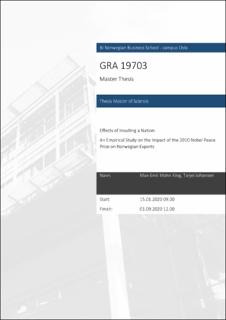| dc.description.abstract | This master thesis revisits the question of the e ects of Chinese trade restriction on Norwegian
exports following the awarding of the 2010 Nobel Peace Prize to Chinese dissident Liu Xiaobo.
Our study contributes to earlier literature both by having access to more recent data as well as
by exploring the possibility of China's neighboring countries being used as intermediaries. Using
a di -in-di approach where the gravity equation serves as a baseline for the counterfactual, our
ndings suggest that the USD value of Norwegian exports to China in aggregates were slightly
lower than normal during the years of treatment, albeit not signi cantly so. At the same time,
exports to Vietnam and South Korea are found to have been much higher than predicted, the
abnormal increase matching to a large degree the timing of the Peace Prize. On disaggregated
levels, we nd that fresh salmon, frozen halibut, sh meal, and to a lesser degree of certainty
petroleum and various mechanical products were likely subjected to such treatment. The total
value of re-exported salmon is estimated to be up to USD 560 million and the value of halibut at
USD 70 million, making the direct `Peace Prize e ect' even smaller considering that these gures
were not recorded as imports to their most likely destination. Next, we apply the same framework
to study the outcome of implementing free trade agreements with Beijing, nding that Western
nations to do so increase their USD value of exports to China in aggregates by an order of 38 to
55 percent compared to their respective counterfactuals. We nevertheless conclude that this gain
comes at a high price, suggesting that the Norwegian delegates who are currently negotiating a
similar agreement with China should take care not to be kind to a fault. | en_US |
